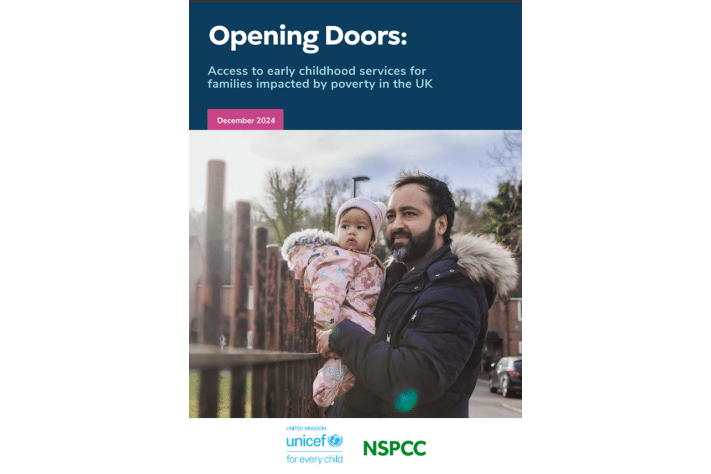5th December 2024
A new report by NSPCC and the UK Committee for UNICEF (UNICEF UK), published this week, sets out how families experiencing poverty face barriers to accessing early childhood services at every level in the UK.
The report, “Opening Doors: access to early childhood services for families impacted by poverty in the UK”, draws from an evidence review and new research with parents and carers who are experiencing poverty and raising children aged under-5, as well as early childhood professionals.
Poverty can have a negative impact on a young child’s development, increasing their likelihood of ill health, poor mental health, and putting them at a disadvantage before they start school. In the UK, more than one in three (36%) children in families where the youngest child is under five are living in poverty.
However, inequalities are not inevitable. Access to high quality early childhood services, such as maternity, health visiting and integrated support in children’s centres or family hubs can significantly reduce these inequalities and provide a lifeline for families on low incomes. Despite this evidence, the report provides new data on a sector under enormous pressure, with early childhood professionals often working in unsupportive environments, and a significant shortage of midwives and health visitors.
The report found that this shortage is resulting in a lack of outreach, rushed appointments, and a different professional at each contact, which can damage relationships with parents and leave them unable to discuss sensitive issues.
One mother said: “It’s really difficult when they change your midwives all the time and change your health visitor, and they change where you’re going for appointments.”
The NSPCC and UNICEF UK believe that the upcoming UK-wide Child Poverty Strategy and the 10-Year Health Plan in England offer crucial opportunities for the UK Government to improve access to local early childhood services and ensure they are inclusive of families on low incomes.
They also want to see the Government invest in rebuilding midwifery and health visiting workforces as well as rolling out integrated services like family hubs across the country. This requires additional investment to address the shortfalls of 2,500 full-time midwives and 5,000 full-time health visitors in England by 2030.
Vicky Nevin, Policy Manager at the NSPCC and co-author of the report, said:
“Midwives, health visitors and other professionals provide support that can make a real difference for parents who want to do the best for their young children but are struggling with money.
“Worryingly, our research shows that service doors are often closed, hard to reach, or out of touch with the needs of families impacted by poverty. This poses serious risks to the health, wellbeing and safety of little ones.
“Early childhood services should be top of the agenda when the Child Poverty Taskforce next meets this December. It is vital for the Government to rebuild and reform services that provide quality support to all babies, young children and their families.”
Responding to the report, Alison Morton iHV CEO said:
“The scourge of poverty and lack of joined-up high-quality support for families is damaging the life chances of too many. We thank the NSPCC and UNICEF UK for laying bare these challenges in their “Opening Doors” report this week. We also thank them for adding their weight of support in calling for a significant increase in the number of health visitors in England, to ensure that all families can have access to high-quality support when they need it. A collective voice is a powerful voice – and partners across the sector are ready, willing and able to work with the government to turn this into reality.”







